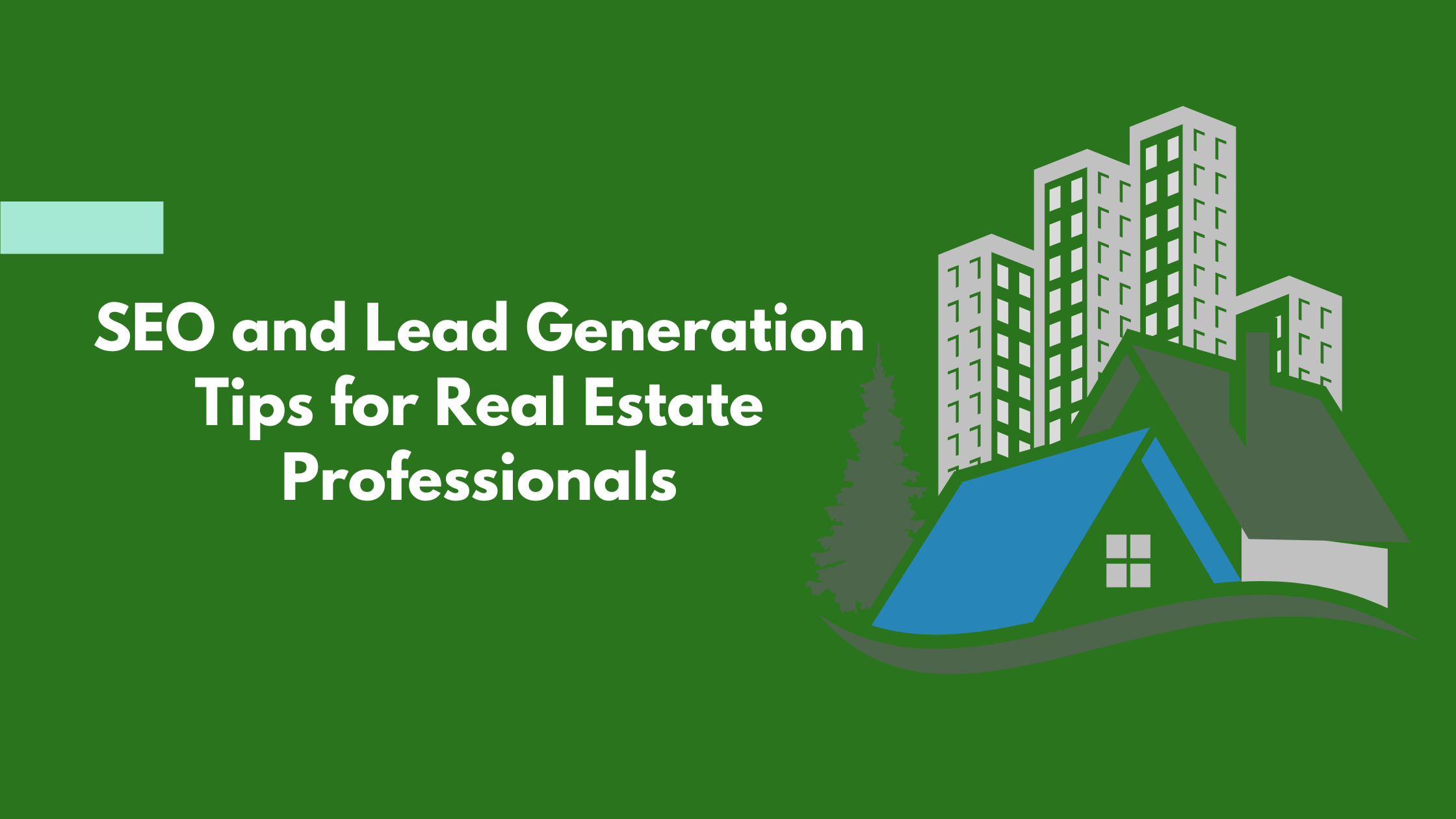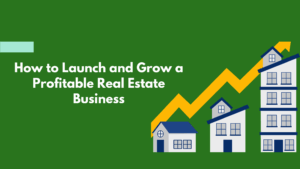Let’s be factual, real estate is a competitive industry. You could have the best listings, the most competitive prices, and the most persuasive sales skills, but if no one can find you online, you’re practically invisible.
Gone are the days when word-of-mouth and yard signs were enough to bring in a steady stream of buyers and sellers. Today, the game is digital. If you want to stay ahead, you need to master SEO and lead generation tips for real estate professionals.
Search engine optimization (SEO) is your ticket to ranking higher on Google, while lead generation ensures that those website visitors turn into real clients. Without both working together, you’re either getting lost in the online noise or attracting the wrong audience.
But don’t worry, this guide will walk you through all the lead generation tips for real estate professionals. You’ll learn how to optimize your real estate services website design, create high-ranking content, and generate leads that actually convert. Let’s dive in.
Table of Contents
Understanding the Basics of Real Estate SEO
If you’ve ever searched for a property online, chances are you typed something like “homes for sale in Miami” or “best real estate agent near me.” The real estate professionals who showed up on the first page of Google didn’t get there by accident. They got there because they optimized their websites for search engines.
SEO is the process of making sure search engines understand what your website is about so they can rank it higher when potential clients search for relevant terms. The higher your site ranks, the more organic traffic you get. And the more traffic you get, the more potential leads you generate. But SEO isn’t just about throwing keywords into a webpage. It’s about delivering value, structuring your website correctly, and ensuring a seamless experience for visitors.
The key to winning in real estate SEO is understanding what people are searching for. Your goal is to match their intent. Are they looking to buy a home? Sell a property? Find a real estate agent? By strategically placing relevant keywords throughout your website, you make it easier for Google to connect you with the right audience. But first, you need a website that’s built to rank.
Optimizing Your Real Estate Website for Search Engines
Your real estate services website design is your digital storefront. If it’s not well-designed, fast, and optimized for search engines, potential clients will click away and move on to the next agent. A strong real estate services website design isn’t just about aesthetics, it’s about performance. A slow, cluttered, or outdated website is a dealbreaker for both users and search engines.
First, your website must be mobile-friendly. The majority of home buyers start their search on their phones, and if your site isn’t responsive, you’ll lose them before they even see your listings. Google also prioritizes mobile-friendly sites, so making sure your website adapts to different screen sizes is non-negotiable.
Next, your site’s loading speed needs to be top-notch. If a page takes more than a few seconds to load, visitors will bounce. Google doesn’t like slow websites, and neither do potential buyers. You can improve speed by compressing images, reducing unnecessary code, and using a reliable hosting provider.
Your website’s structure also plays a huge role in real estate services website design SEO. Organize your content logically so search engines and visitors can easily navigate through your site. Every page should have a clear purpose, whether it’s showcasing property listings, providing home-buying tips, or explaining how to make a website for real estate services.

Keyword Research for Real Estate Professionals
Keyword research is the backbone of SEO in every website for real estate business. If you don’t know what your potential clients are searching for, how can you show up in their search results? Instead of guessing, you need a strategic approach to find the right keywords that drive traffic and conversions.
Start by thinking like your clients. If you were looking for a real estate agent or property, what would you type into Google? Terms like “homes for sale in Dallas,” “best neighborhoods in Chicago,” or “real estate agents near me” are common searches that signal strong intent.
Once you have an idea of what people are looking for, use keyword research tools like Google Keyword Planner or Ahrefs to refine your list. Long-tail keywords, those that are more specific and detailed, are particularly valuable. Instead of just targeting “real estate services,” try optimizing for “how to make a website for real estate services” or “website for real estate business that generates leads.” These longer phrases attract serious buyers and sellers rather than casual browsers.
Content Marketing Strategies to Attract Leads

This is a very important SEO and lead generation tips for real estate professionals. If you want to consistently attract leads, you need to create content that answers their questions, solves their problems, and positions you as an expert in the real estate space. Blogging, video marketing, and social media content are powerful tools for this.
A real estate blog is an excellent way to drive organic traffic. Let your website for real estate business write about topics that interest buyers and sellers, such as “How to Stage Your Home for a Quick Sale,” “The Best Mortgage Options for First-Time Buyers,” or “Neighborhood Spotlight: Best Places to Live in Atlanta.” These kinds of posts provide value while naturally incorporating your keywords.
Video content is another game-changer. Virtual property tours, market updates, and home-buying tips perform exceptionally well on platforms like YouTube, Instagram, and Facebook. Buyers want to see homes in action, and video gives them a closer look without needing an in-person visit.
Local SEO for Real Estate
Real estate is hyper-local, which means local SEO is your best friend. When people search for homes or real estate services in their area, you want to be the first name they see.
Google My Business is one of the most powerful tools for local SEO. If you haven’t claimed and optimized your GMB profile yet, you’re missing out on a huge opportunity. Make sure your profile is complete with up-to-date contact details, high-quality images, and client reviews. Positive reviews boost your credibility and make you more attractive to potential clients.
Speaking of credibility, getting listed in online directories like Zillow, Realtor.com, and local chamber of commerce websites can also boost your local visibility. The more reputable sites link back to you, the more Google sees you as a trusted authority in your market.
Leveraging Paid Ads for Quick Lead Generation
SEO is a long-term game, but if you need leads fast, paid ads can give you an immediate boost. Google Ads and Facebook Ads allow you to target specific demographics and locations, ensuring your real estate services get in front of the right people.
Google Ads work best for high-intent searches, like “best real estate agent in New York” or “luxury homes for sale in Miami.” These people are actively looking for a real estate professional, making them more likely to convert. Facebook Ads, on the other hand, are great for brand awareness and retargeting. If someone visits your website but doesn’t take action, a retargeting ad can remind them why they should work with you.
Building an Email Marketing Funnel for Lead Nurturing
Not every lead is ready to buy or sell immediately. Some need weeks or even months before making a decision. That’s where email marketing comes in as a very useful SEO and lead generation tips for real estate professionals. A well-crafted email strategy helps you stay on their radar so that when they’re finally ready, you’re the first person they think of.
The key to successful email marketing is capturing leads in the first place. You need to offer something valuable in exchange for their email. This could be a free home-buying guide, a market report, or exclusive access to off-market listings. Once you have their email, the real work begins.
Email segmentation is crucial. You shouldn’t send the same emails to first-time buyers, sellers, and investors. Instead, categorize your leads based on their interests and where they are in their real estate journey. A first-time homebuyer needs different content than someone looking to sell their luxury home.
Your email sequence should be strategic. Start with a welcome email that introduces who you are and how you can help. Follow up with educational content, like blog posts on the home-buying process or market trends. Then, mix in success stories from past clients to build trust. As they engage with your emails, move them closer to a direct conversation, whether through a free consultation or a personalized property recommendation.
Most importantly, don’t bombard people with sales pitches. Instead, focus on delivering value. If you consistently provide useful insights, your leads will naturally turn to you when they’re ready to take action.
Tracking and Improving Your SEO & Lead Generation Efforts
Generating leads isn’t a one-and-done process. You need to track what’s working and refine your strategy based on data. If you’re not monitoring your website traffic, ad performance, and email engagement rates, you’re flying blind.
Google Analytics is one of the best tools for tracking your website’s performance. It shows you where your visitors are coming from, which pages they’re engaging with, and how long they’re staying on your site. If a blog post is driving a ton of traffic, consider creating more content on similar topics. If visitors are leaving your site too quickly, it might be time to improve your real estate services website design or optimize your content.
Google Search Console helps you understand which keywords are bringing in traffic. If certain keywords are performing well, double down on them in future content. If some pages aren’t ranking as well as they should, optimizing them with better content and internal links can improve their visibility.
If you’re running paid ads, platforms like Facebook Ads Manager and Google Ads provide insights into which campaigns are converting and which ones aren’t. If a particular ad isn’t bringing in leads, tweak your targeting or ad copy. Small adjustments can make a big difference in ROI.
Your email marketing efforts should also be measured. Open rates, click-through rates, and conversion rates help you understand how engaged your audience is. If your emails aren’t getting opened, your subject lines might need improvement. If people are opening but not clicking, your content might need more compelling calls to action.
The bottom line is that marketing isn’t about guessing, it’s about testing, tracking, and improving. The real estate professionals who consistently analyze their data and refine their strategies are the ones who see long-term success.
Take Your Real Estate Business to the Next Level
SEO and lead generation aren’t just buzzwords, they’re essential strategies that separate top-performing real estate professionals from those struggling to keep up. By optimizing your website, creating high-quality content, and leveraging paid ads, you can attract more qualified leads and close more deals.
If all of this sounds overwhelming, you don’t have to do it alone. At Texttot Digital, we specialize in real estate services website design and digital marketing strategies that bring real results. Whether you need a fully optimized website or a lead generation system that works, we’ve got you covered.


